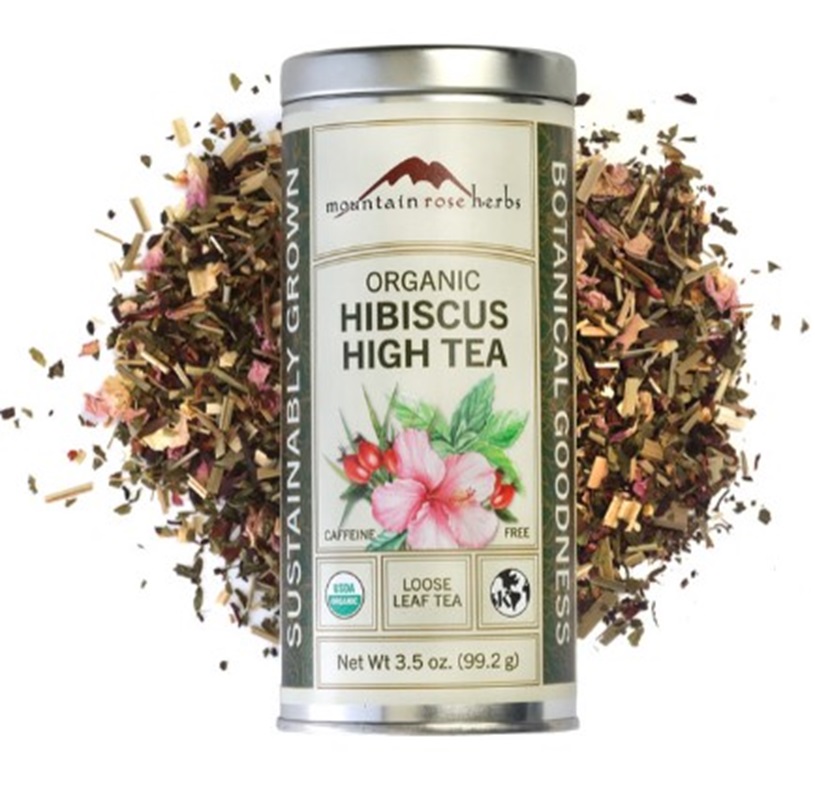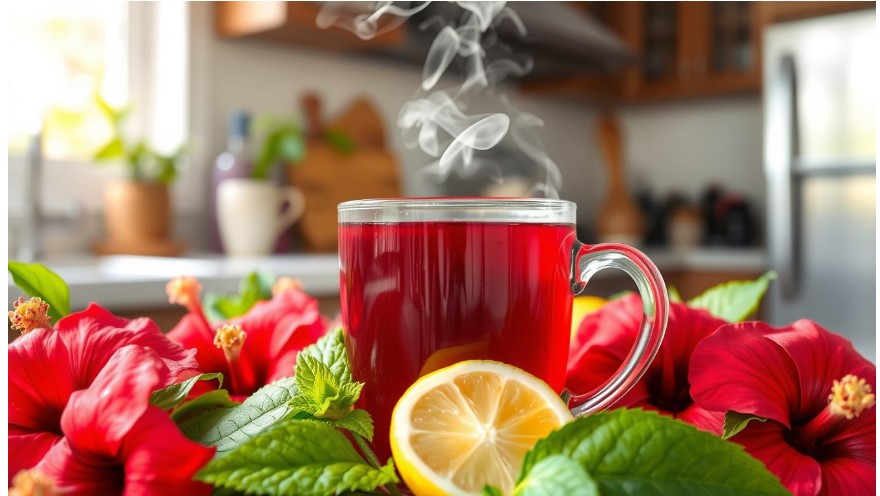Discover the Health Benefits of Hibiscus Tea
Hibiscus tea, a vibrant and flavorful herbal infusion, has gained widespread popularity as a natural health remedy and refreshing beverage. This captivating crimson-hued tea, derived from the Hibiscus sabdariffa plant, offers a plethora of health benefits. It has captivated wellness enthusiasts around the world. From supporting cardiovascular health to boosting the immune system, the medicinal properties of hibiscus tea make it a true gem in the realm of natural health solutions.

Key Takeaways
- Hibiscus tea is a natural source of antioxidants, helping to combat free radical damage.
- Regular consumption of hibiscus tea may help manage blood pressure and support heart health.
- The tea contains vitamin C and anti-inflammatory compounds, which can strengthen the immune system.
- Hibiscus tea may aid in weight management and metabolism support.
- Brewing hibiscus tea properly can maximize its therapeutic benefits.
What is Hibiscus Tea and Its Origins
Hibiscus tea, a vibrant and tangy herbal infusion, has captivated tea enthusiasts worldwide. Derived from the calyces of the hibiscus sabdariffa plant, this refreshing beverage has deep roots in traditional medicine and cultural practices across the globe.
Traditional Uses Across Different Cultures
Hibiscus tea, also known as “Agua de Jamaica” in Latin America, “Karkade” in the Middle East, and “Bissap” in West Africa, has been valued for centuries. It’s prized for its medicinal properties and distinctive flavor. In ancient Egypt, the flower was used to make a red, tart drink believed to have sacred and restorative powers.
In traditional Chinese and Ayurvedic medicine, hibiscus is revered for its cooling, detoxifying, and heart-healthy benefits.
Botanical Profile of Hibiscus sabdariffa
The hibiscus sabdariffa plant, a tropical, bushy shrub, can grow up to 8 feet tall. Its large, vibrant red calyces, or protective flower cups, are the primary source of the tea’s signature deep red hue and tart, cranberry-like taste.
How Hibiscus Tea is Harvested and Processed
The process of creating hibiscus tea begins with the careful harvesting of the plant’s calyces. These are then dried in the sun or through a controlled drying process. Once dried, the calyces are typically cut or crushed and then infused in hot water.
This creates the deep, ruby-red brew that is enjoyed worldwide as a refreshing and healthy herbal tea.

Powerful Antioxidant Properties in Hibiscus Tea
Hibiscus tea is renowned for its high antioxidant content, making it a formidable ally against free radicals and oxidative stress. Its deep red color is a clear indicator of its rich polyphenol profile. This includes anthocyanins, flavonoids, and phenolic acids, all of which are beneficial for our health.
Research indicates that a single cup of hibiscus tea can pack more antioxidants than blueberries or pomegranate juice. This is due to its key compounds, such as antioxidants, which effectively neutralize free radicals and reduce oxidative stress in the body.
| Beverage | Antioxidant Capacity (μmol TE/100 mL) |
|---|---|
| Hibiscus Tea | 1,800 – 2,500 |
| Green Tea | 1,000 – 1,600 |
| Black Tea | 800 – 1,200 |
| Pomegranate Juice | 1,500 – 2,000 |
The table highlights hibiscus tea’s remarkable antioxidant capacity, surpassing even green tea and pomegranate juice. This exceptional profile positions hibiscus tea as an ideal choice for enhancing antioxidant intake. It supports the body’s natural defenses against free radicals and oxidative stress.

“Hibiscus tea is a true antioxidant powerhouse, with a polyphenol content that rivals even the most renowned superfood juices.”
Heart Health Benefits and Blood Pressure Management
Recent studies indicate that hibiscus tea may greatly benefit heart health and blood pressure control. This vibrant, tart drink has been found to positively affect both systolic and diastolic blood pressure. It emerges as a natural option for those worried about hypertension and heart disease.
Impact on Systolic and Diastolic Blood Pressure
Research shows that drinking hibiscus tea regularly can significantly lower systolic blood pressure. It also reduces diastolic blood pressure, the pressure in arteries when the heart rests. These results suggest that hibiscus tea could be a natural way to manage blood pressure.
Cardiovascular Disease Prevention
Hibiscus tea may also play a role in preventing cardiovascular diseases. Its high antioxidant content, especially polyphenols, could protect the heart and blood vessels from oxidative stress and inflammation. These are major contributors to heart disease.
Recommended Daily Intake for Heart Health
Experts advise drinking 3 cups of hibiscus tea daily for the best heart health benefits. This amount is linked to the most significant blood pressure reductions and heart disease prevention. Yet, it’s crucial to talk to a healthcare professional, as individual responses can vary.
“Incorporating hibiscus tea into one’s daily routine may be an effective way to naturally manage blood pressure levels and reduce the risk of heart disease.”
Weight Management and Metabolism Support
Hibiscus tea, known for its vibrant color and rich flavor, is gaining attention for its potential in weight management and metabolism support. Research indicates it may offer a unique blend of properties. These could help in achieving a healthy weight and boosting metabolic rate.
Hibiscus tea stands out in supporting weight loss. Studies show its active compounds, like anthocyanins and chlorogenic acids, may block fat and carbohydrate absorption. This could limit calorie storage as body fat. It acts as a natural metabolism boost, making it a valuable aid for those looking for a natural slimming aid.
| Potential Benefits of Hibiscus Tea for Weight Management | Supporting Evidence |
|---|---|
| Inhibits fat absorption | Studies have shown that hibiscus extract can reduce the absorption of dietary fats, potentially leading to reduced calorie intake and weight loss. |
| Boosts metabolic rate | Compounds in hibiscus tea, such as anthocyanins, have been linked to increased thermogenesis and enhanced fat-burning capabilities. |
| Supports healthy blood sugar levels | Hibiscus has been found to have a positive impact on blood sugar regulation, which can be beneficial for weight management and overall metabolic health. |
While more research is needed, current evidence suggests hibiscus tea could be a valuable addition to a weight loss regimen. It’s crucial to consult with a healthcare professional to tailor a plan that suits your needs.
Immune System Boosting Properties
Hibiscus tea is more than a refreshing drink; it’s a powerhouse for immune health. Its high vitamin C and anti-inflammatory properties make it a key player in overall wellness.
Vitamin C Content and Immunity
Vitamin C is a key nutrient for immune health. Hibiscus tea is rich in this vitamin, offering a natural way to boost the body’s defenses. It aids in white blood cell production, crucial for fighting off illness and infection.
Anti-inflammatory Effects
Inflammation can weaken the immune system, making us more prone to illness. Hibiscus tea’s anti-inflammatory properties help combat this. Its phytochemicals, like anthocyanins, reduce inflammation, supporting a stronger immune response.
Seasonal Wellness Support
Adding hibiscus tea to your routine is especially beneficial during seasonal changes. Its immune support and anti-inflammatory effects help the body adjust to environmental shifts. This ensures you stay healthy all year round.
| Nutrient | Amount in Hibiscus Tea | Benefits for Immunity |
|---|---|---|
| Vitamin C | 30-40 mg per cup | Supports white blood cell production and function |
| Antioxidants | High levels of anthocyanins and polyphenols | Reduce inflammation and oxidative stress |
| Anti-inflammatory Compounds | Hibiscus sabdariffa compounds | Inhibit the release of inflammatory mediators |
By making hibiscus tea a part of your daily routine, you harness its immune-boosting powers. Enjoy a refreshing, healthful drink that supports your wellness, especially during seasonal shifts.
Digestive Health and Detoxification Benefits
Hibiscus tea is more than just a tasty drink; it’s a powerhouse for digestive health and natural detox. As a digestive aid, it eases the digestive system and boosts gut health.
Its role in supporting liver health is significant. Hibiscus tea’s antioxidants and phytochemicals enhance liver function, aiding in detox. This makes it a key ally for those aiming to cleanse their bodies and live healthily.
- Hibiscus tea stimulates bile production, crucial for digestion and nutrient absorption.
- Its diuretic properties help flush out toxins and waste, promoting natural detox.
- Regular hibiscus tea consumption can ease digestive issues like bloating, constipation, and acid reflux.
Adding hibiscus tea to your daily routine is a simple yet effective way to support digestive health and enhance detox. Enjoy its refreshing taste while benefiting from its remarkable properties.
How to Brew the Perfect Cup of Hibiscus Tea
Brewing the perfect cup of hibiscus tea is an art that unlocks its full flavor and health benefits. Whether you prefer hot or cold brew, knowing the right techniques and steeping times is crucial. Let’s delve into the keys to crafting the ultimate hibiscus tea experience.
Hot Brewing Method
To brew a classic hot hibiscus tea, start by boiling fresh, filtered water. Add 1-2 teaspoons of dried hibiscus flowers for every 8 ounces of water. Steep the tea for 5-7 minutes, depending on your desired strength. The longer it steeps, the more intense the flavor will be.
Use a tea pot or heat-resistant container to keep the brewing temperature ideal. This ensures the best flavor extraction.
Cold Brew Technique
For a refreshing cold brew, place dried hibiscus flowers in a pitcher or jar. Pour in cold or room temperature water. Cover and refrigerate for 6-8 hours, or even overnight. This slow, cold steeping extracts a smoother, less acidic flavor.
Optimal Steeping Times
- Hot brew: 5-7 minutes
- Cold brew: 6-8 hours
Regardless of your brewing method, attention to steeping time is key. Oversteeping can make the tea bitter and astringent. Understeeping results in a weak, lackluster taste. Experiment to find your perfect balance of flavor and strength.
With these simple tips, you’ll soon be enjoying the most delightful, vibrant hibiscus tea. Embrace the brewing ritual and relish the refreshing, health-boosting benefits of this vibrant herbal delight.
Potential Side Effects and Precautions
Hibiscus tea is generally safe for most people, but it’s crucial to know about potential side effects and precautions. Hibiscus tea side effects, contraindications, and safety considerations are key when adding this vibrant beverage to your wellness routine.
The main concern with hibiscus tea is its effect on blood pressure. It can help manage high blood pressure but may lower blood pressure too much for those with hypotension. If you have low blood pressure or are on blood pressure medication, consult a healthcare professional before drinking hibiscus tea.
- People with kidney disease or on dialysis should talk to their doctor before drinking hibiscus tea. The high antioxidant content may affect kidney function.
- Pregnant and breastfeeding women should limit their hibiscus tea intake. The effects on fetal development and infant health are not fully understood.
- Diabetics should watch their blood sugar levels when drinking hibiscus tea. It may interact with diabetes medications.
Hibiscus tea side effects can include digestive issues like nausea, bloating, or diarrhea, especially for those with sensitive stomachs. Start with a small cup and gradually increase the amount to see how your body reacts.
“Consult with a healthcare professional before incorporating hibiscus tea into your routine, especially if you have any underlying medical conditions or are taking medication.”
By understanding hibiscus tea contraindications and safety considerations, you can enjoy its health benefits while avoiding potential adverse effects.
Delicious Hibiscus Tea Recipes and Combinations
Discover the full potential of hibiscus tea with our refreshing summer blends and therapeutic winter combinations. Explore a world of flavorful hibiscus tea recipes. These not only delight your taste buds but also offer numerous health benefits.
Refreshing Summer Blends
Beat the summer heat with our vibrant hibiscus tea recipes. Mix the tartness of hibiscus with the sweetness of fruit juices, fresh herbs, and spices. This creates a refreshing experience unlike any other.
- Hibiscus Lemonade: A classic pairing of hibiscus tea and fresh lemon juice, perfect for a hot summer day.
- Hibiscus Berry Blast: Infuse your tea with the juicy flavors of berries like raspberries, blackberries, or strawberries.
- Minty Hibiscus Cooler: Muddle fresh mint leaves with hibiscus tea and a touch of honey for a cooling and invigorating sip.
Therapeutic Winter Combinations
As temperatures drop, our soothing and comforting hibiscus tea blends warm you up. Explore the synergy of hibiscus with various herbs and spices for a truly therapeutic experience.
- Hibiscus Ginger Tea: Combine the tart hibiscus with the warm, spicy notes of ginger for a powerful anti-inflammatory boost.
- Hibiscus Cinnamon Chai: Infuse your hibiscus tea with aromatic cinnamon, cardamom, and other traditional chai spices for a cozy and comforting drink.
- Hibiscus Turmeric Tonic: Harness the potent anti-inflammatory properties of turmeric by blending it with hibiscus tea for a wellness-enhancing elixir.
Experiment with these recipes and create your own personalized hibiscus tea blends. Enjoy the diverse flavors and health benefits of this remarkable herbal tea.
Conclusion
Hibiscus tea stands out as a natural health drink, packed with benefits for overall wellness. It boasts powerful antioxidant properties, positively impacts heart health, aids in weight management, and boosts immune function. This vibrant herbal tea is a versatile remedy, enhancing our everyday well-being.
Incorporating hibiscus tea into your routine can be a simple yet impactful step towards a healthier lifestyle. It’s perfect for any season, offering a refreshing summer drink or a soothing winter elixir. Its versatility allows for endless creative combinations, making it a delightful addition to any tea enthusiast’s collection.
As you continue your journey towards better health, we encourage you to explore the remarkable world of hibiscus tea. Discover how this natural health drink can support your herbal wellness goals. With its rich history, diverse uses, and impressive scientific backing, hibiscus tea is poised to become a staple in your holistic health regimen.
FAQ
What are the health benefits of drinking hibiscus tea?
Hibiscus tea is a powerhouse of antioxidants, supporting heart health and regulating blood pressure. It boosts metabolism and enhances the immune system. It also has anti-inflammatory properties and aids in digestive health and detoxification.
Where does hibiscus tea come from and how is it made?
Hibiscus tea originates from the vibrant red calyces of the Hibiscus sabdariffa plant, native to tropical and subtropical regions. The calyces are dried and steeped in hot water, creating a refreshing herbal infusion.
How much antioxidants does hibiscus tea contain?
Hibiscus tea is rich in antioxidants, surpassing many popular beverages like green and black tea. It contains polyphenols, including anthocyanins, responsible for its deep red color.
Can drinking hibiscus tea help lower blood pressure?
Yes, studies indicate that hibiscus tea can lower both systolic and diastolic blood pressure. Its antioxidants and diuretic properties contribute to this effect, especially in those with hypertension or prehypertension.
Does hibiscus tea have any weight loss or metabolism-boosting benefits?
Research suggests hibiscus tea may aid in weight management and metabolism. Its diuretic properties help flush out toxins and excess water. Polyphenols may also inhibit dietary fat absorption and storage. The tea’s mild stimulant effects provide a metabolism boost.
How can hibiscus tea support the immune system?
Hibiscus tea is a vitamin C powerhouse, crucial for immune function. It has anti-inflammatory properties that reduce oxidative stress and support immune health. Its antioxidants also enhance the body’s ability to fight off illnesses and infections.
What are some potential side effects or precautions with hibiscus tea?
Hibiscus tea is generally safe in moderation. However, it may interact with blood thinners and diabetes medications. Pregnant or breastfeeding women and individuals with kidney or liver disease should consult their healthcare provider before consuming it.
How should I brew the perfect cup of hibiscus tea?
For the perfect cup, use 1-2 teaspoons of dried hibiscus flowers per 8 ounces of water. Boil the water, then remove from heat and steep the flowers for 5-7 minutes. For a stronger flavor, steep up to 10 minutes. Adjust the steeping time and flower amount to your liking.
